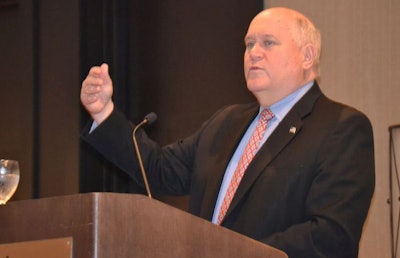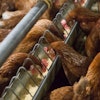
Organizations like the American Farm Bureau Federation and National Pork Producers Council have actively been challenging anti-animal confinement laws, such as California’s Proposition 12. However, people probably shouldn’t expect any members of Congress to challenge them anytime soon.
One of Washington’s most fierce opponents to such laws was former Rep. Steve King, who on more than one occasion drafted legislation that challenged these laws. King, R-Iowa, did so feeling that states like California have no right to legislate production agriculture in other states, even saying it is unconstitutional. Iowa is a major pork producer and egg producer, and those are the two agrifood sectors most heavily targeted by Proposition 12. King’s concern was that producers in Iowa and other states would have to comply with the standards set forth by that law if they wanted to sell product in California.
King’s most recent attempt to challenge those laws was 2019’s Protect Interstate Commerce Act (PICA), which never was passed into law. And King, amid a controversy over what most people perceived as racist remarks, shortly thereafter lost his bid for re-election.
One of the co-sponsors of King’s PICA, Rep. Ron Estes, R-Kansas, spoke at the Kansas Grain and Feed Association (KGFA) meeting on April 12, and while he was there, I asked him if PICA, out of a lack of a better way of phrasing it, ended along with King’s political career.
He indicated that proponents of PICA may be down, but not out.
Estes said the direction some in the federal government wants to take is “let’s not have a patchwork system of where states are putting in special rules and regulations for dealing with how animal agriculture” production methods are conducted. What Estes and others want is a “national standards system.”
But that may take a while, he said.
“The biggest problem we have is going back to the Democrats in the majority in the House of Representatives. It’s just so tough to get some of those policies through when the speaker (Rep. Nancy Pelosi) doesn’t support it. She doesn’t care about it, and most of the caucus doesn’t, so therefore she goes out and promotes that we’re not going to move in that direction,” said Estes.
Estes, who spent much of his time during his KGFA speech pointing proverbial fingers at Democrats, added, “that could change some when we go forward,” indicating that a Republican majority in the House might place a higher priority on animal production systems legislation. However, he acknowledged he had not had any recent conversations with House Agriculture Committee Ranking Member Glenn “G.T.” Thompson, R-Pennsylvania, on the matter.
Is Estes’ answer acceptable?
Having a nationwide set of standards rather than the patchwork Estes described seems like a sensible idea to me. But I do like what PICA stood for.
In essence, it was King saying, “I’m from Iowa and I’m not going to let folks in California push us around,” and as a co-sponsor, Estes was saying, “I’m from Kansas and I’m not going to let folks in California push us around.”
PICA is a reflection of what Congress should be. People putting the interests of the geographical areas they represent first without regard for political party affiliation. After all, Democrats outside of California have opposed Proposition 12 and its predecessor, Proposition 2, before.
But as Estes pointed out, Pelosi doesn’t care about legislation concerning farm animal production methods, so neither does her caucus. In other words, those caucus members are thinking since their political party’s leader doesn’t care, they won’t, either.
But is it just the Democrats in the House who are puppets to their party? Estes might have given us a little insight when he said he hadn’t recently talked to Thompson about farm animal production. Maybe he’s thinking of the wrong person. If the Democrats are the ones so apathetic about the topic, could it be that the first person he should talk to is Rep. Charice Davids, Kansas’ lone Democrat in Washington?
It makes sense to me.



















